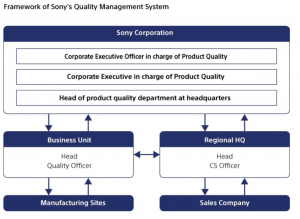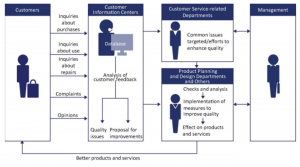Sony’s Commitment to Quality and Services
The chapter on Quality and Performance in the textbook introduces first to one of the largest multimedia retailers in the world, QVC Inc. which stands for Quality, Value, and Convenience. QVC’s processes all work together to deliver outstanding quality and service to its customers and through this focus, QVC’s revenues exceeded $8.6 billion in 2013. Quality and service are top focuses in many companies. What I want to focus on is Sony Inc. Sony is a Japanese multinational conglomerate and its businesses include consumer and professional electronics, gaming, entertainment and financial services. Sony’s CSR (corporate social responsibility) report provides us insight on the value they place on quality. Here’s a quote directly taken from their website on CSR, “Sony’s corporate social responsibility (CSR) activities reflect our ongoing commitment to innovation and sound business practices and to creating products, services and content that excite and inspire audiences worldwide.” Sony has seven key CSR areas of focus and one of them is Quality and Services.
Total quality management (TQM) is a philosophy that stresses three principles for achieving high levels of process performance and quality. These principles are related to (1) customer satisfaction, (2) employee involvement, and (3) continuous improvement. Sony hits all of these principles in their report. The following is a diagram of Sony’s Quality Management System.

Customer Satisfaction
Customers are satisfied when their expectations regarding a service or product have been satisfied. According to the report, “Sony makes active use customer feedback to improve its products and customer services.” The feedback received is handled by Sony Customer Information Centers and is thoroughly analyzed. This information is transferred to the planning, design, and product quality groups to improve product quality and performance. Sony goes above and beyond to provide the best quality and service which leads to customer satisfaction. In 2003, the company implemented a Quality Hotline to gather information and complaints on products which will be used to improve processes or products. These processes reflect the Sony Pledge of Quality, “Sony employees will always respect our customers’ viewpoints in striving to deliver product quality and customer service that exceed their expectations.” The following is a diagram of the process.

Employee Involvement
A program in employee involvement includes changing organizational culture and encouraging teamwork. According to the textbook, “one of the main challenges in developing the proper culture for TQM is to define customer for each employee. Sony provides various type of training for its employees which further supports their commitment to providing high-quality service to customers around the world. In TQM, everyone in the organization should know that quality control is important. At Sony, employees are trained to help customers get the greatest possible enjoyment from their Sony products.
Continuous Improvement
This is the philosophy of continually seeking ways to improve processes and this is exemplified from this statement, “In addition to continuously improving product quality, Sony is taking various steps to improve its responsiveness and its customer service capabilities.” This is in line with their pledge of quality. Sony tailors its support to the always changing world which requires constant innovation and improvement They provide support through live internet chat sessions, social media, and online community forums as well as conduct surveys on customer satisfaction and makes improvements based on survey results to continually improve satisfaction.
Do you think Sony is a good example of TQM? Have you ever experienced Sony’s exceptional customer service?
Sources:
Mark,
I agree that Sony is a great example of TQM (total quality management). The corporate offices have clearly made a large commitment to maintain the best possible quality. This is shown through multiple branches of the company including its product quality executives, business units, regional headquarters, and other positions. These pieces and positions all work together and are expected to maintain this quality.
I think all companies should strive to emulate Sony’s ability to keep its customers and employees involved. When considering product and service quality, the head offices need to be on the same page as these two, and the employees must also understand the customers needs to meet them.
I have experienced Sony’s ability to satisfy their customers needs. When I moved into my freshman dorm room, I bought a Sony Smart TV. I was having difficulty setting up the TV, called Sony, and they were able to help me set up all the various apps such as Netflix and HBO. Not only have I experienced clear and easy customer service, but believe they were able to find and take advantage of a customer need, which was the easy and convenient accessibility of apps such as Netflix and HBO, which had previously not been as readily available on other TV’s.
Mark, this post about Sony is actually somewhat uprising. Since Sony is such large company it feels like it would be less attentive to customer. When you look at larger companies in America and around the world, the saying “the customer is always right” tends to hold true. However, when it comes to feedback, sometimes their advice is ignored. This obviously can be a good thing as people will say some pretty ridiculous stuff. Taking everyone’s advice into account would bring a company to ruin as some of them don’t know much about running a business and others don’t know how to run a business like Sony. There is a reason they have been around for so long and continue to be successful. There are times when enough people speak out though, and that is where companies like Sony should start to listen. My experience with Sony was when I owned a PlayStation. The online functionality was provided by Sony and it gave it the edge over its counterpart at Microsoft, the Xbox. Then one day, Sony released a pricing system for its online functions very similar if not the exact same to Xbox. Needless to say I was very upset with this new development as were many others. But Sony ignored the backlash they got from making this decision since they most likely found the profits they made were worth the unhappy customers and the loss of other customers. Then sometime after this change, the PlayStation network was hacked and many people had their personal information stolen, which included credit card numbers. This was a great lapse in quality of the product and resulted in exactly what one would expect. People were absolutely enraged at Sony, and for good reason too. They had entrusted Sony with their personal information and it had been taken. Since that day, Sony has made a great recovery. As Mark said above, Sony now has a large system in place to keep quality in check, making sure to use all of the resources they have available to keep the customer happy and continuing to improve the product. For example, they have tasked a corporate executive to be in charge of product quality. By restoring faith in the quality of product, Sony has expanded their customer base and continues to be a successful company in today’s markets.
Mark,
I like how you looks and used a business outside of the food industry because it is important for every business to deliver quality products. Sony is very interesting to look at because of the different quality aspects it needs to consistently hit (customer service and each individual product). I never knew Sony had a Pledge of Quality but it is definitely a good statement to stand by if it can be backed up. As stated in the statement, Sony strives to exceed customer expectations when it comes to customer service and product quality. This is important for a business, especially one like Sony, because there are competitors out there that offer products just as good and it is easy for consumers to switcher from one brand to another. But on the other side of things, if Sony continually delivers high quality products, consumers are more likely to have brand loyalty and buy other Sony products. In this case, delivering high quality is not only important for the present, but also for the future.
I do think that Sony is a good example of total quality management, especially after taking a look at the charts that you shared. The three principle of TQM are interconnected, in my opinion, and Sony has found a way to make the interactions natural, easy, and productive.
Customer satisfaction is handled when the company takes the time to listen to what they have to say. If problems arise or suggestions are brought up, it is sometimes in the company’s best interest to pay attention to them if that means a higher customer retention rate.
Employees must be involved from the customer level onward to ensure that 1) suggestions are being considered 2) new products or services are actually benefiting the consumer and 3) to continue to handle quality related issues.
If the interaction between the customer and the company stays positive, these types of relationships will continue to occur and can only improve. Sony has done a great job in creating an opportunity for users to have a relationship and essentially is continuing their innovation cycle.
You mention different ways that Sony excels at each of the TQM principles, highlighting their ability to deliver quality products. Just like QVC, Sony places a strong importance and value on the customer. For B2C brands, this might be one of the most important things they can do, considering that without happy customers, their brand wouldn’t exist.
Mark,
Thanks for sharing this thoughtful post about Sony. Managing quality is an important topic, especially as it becomes easier and easier for complaints about products to be shared–not only with the company, but also with consumers’ friends and family through social media. I believe this push towards higher accountability is good for consumers, but potentially costly and harmful for firms.
With revenue last year of about $70 billion, Sony has a lot for which it may be held accountable by its customers. Were its quality management processes lacking, the firm could expect to find itself in the crosshairs of controversy. The helpful charts that you pulled from Sony’s website showed that they are certainly committed to quality and maintaining a positive reputation with their clients.